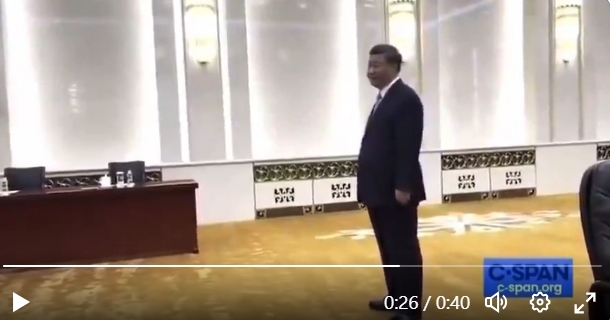
The niceties of diplomacy can sometimes be comical, but they are no joke. Witness the treatment of Beijing’s delegation in Pyongyang in late April. Chinese-language social media showed a “humiliating” seating arrangement, with Kim Jong Un “alone on one side of a big oval table and nine or 10 Chinese officials facing him on the other.”
“The senior Chinese Communist Party officials are treated as ministerial officials in front of Kim Jong Un,” one post reads. “It not only severely humiliated Zhao Leji, but also mocked” Xi Jinping.
The choice of an oval table was also irksome.
Mismatch
But who is this Zhao Leji in a meeting with North Korea’s supreme leader? He is “current chairman of the Standing Committee of the [PRC’s] National People’s Congress and the third-ranking member of the Politburo Standing Committee of the Chinese Communist Party.” Hmm, do we have a bit of a ranking mismatch? Maybe Kim was making a point of his own.
Red China is sensitive to slights and recognizes them when they occur. It can certainly dish them out.
Earlier this month German Chancellor Olaf Scholz arrived in Chongqing, where there was no brass band and no red carpet. He was met by the vice mayor of the city—likely the mayor was too busy—and by China’s ambassador to Germany, a man Scholz could meet any day of the week in Germany.
It appears also that Scholz’s agenda had not quite been firmed up when he landed, as he merely hoped “to meet with President Xi Jinping and Premier Li Qiang later” in the week. Embarrassing.
Beijing thus made Scholz, already a figure of ridicule, more ridiculous still.
If you find these sorts of details interesting—of arrivals, departures, welcomes, arrangements—you’ll see that they tend to be omitted from mainstream media reports, or at best, minimized and normalized without comment. It’s worth excavating the details. Certainly the diplomats themselves take note.
One-hour, three-way
Consider last year’s visit to Red China by the scandal-ridden Ursula von der Leyen, president of the European Commission. Her trip began in a cloud of stories coloring it as a joint effort with French President Emmanuel Macron. Macron, however, traveled separately on a different, business-promotion itinerary. The duo eventually met up only briefly, to “share just one formal meeting,” a “three-way powwow with Chinese President Xi Jinping.”
A one-hour three-way to cover both the French and EU agendas? That could be a worse insult than Kim’s oval table. But there was a consolation prize Macron did not receive: Von der Leyen conducted “her own meeting with Chinese Premier Li Qiang.”
Judging by the protocol display that followed, though, her separate meeting may not have gone well. She exited China without accompaniment by a official, “through the public terminal at the airport—with baggage screening and passport checks.”
Papers, please; and what was the purpose of your visit?
A Twitter user posted her airport picture with the comment that she had been “shown her status—in China, they know how.”
Speaking of no bands, no flags, no red carpet, it would be hard to beat the humiliation inflicted on U.S. Secretary of State Antony Blinken in late April. He arrived in Shanghai to be greeted, without fanfare, by the leader of that city’s Communist Party. The mayor and deputy mayor seemed not to be available, nor anyone from the Foreign Ministry.
He then embarrassed himself and the United States by pretending to conduct State Department business with a city-level party official. He “met with the city’s top official, Communist Party Secretary Chen Jining, and ‘raised concerns about [Chinese] trade policies and non-market economic practices,’ the State Department said in a statement.”
Strolling in Shanghai
Nikkei Asia had a sunny interpretation of what was happening: “U.S. Secretary of State Antony Blinken began his three-day visit to China on a light note by taking in a basketball game, strolling through Shanghai’s Yu Garden and along the historic Bund, and holding a friendly meeting with the local Communist Party secretary.”
This is what you get without specialized diplomatic correspondents: “a light note.” The man has three days and he spends day one chatting with a political boss, watching a sports contest, strolling in the park (!) and…speaking “to students at New York University’s Shanghai branch.”
This sounds like a man with a lot of time on his hands. Cancellations, unfinished agendas—these can be calculated slights.
He eventually got a meeting with Xi that was confirmed only an hour in advance. Ouch. Someone filmed Xi pacing before the meeting, asking “When does he plan to leave?”
“I was extremely clear about our concerns,” Blinken said about that meeting. Concerns conveyed behind closed doors, of course, not publicly.
But wait. Instead of flying home and giving a press conference there, reserving his criticisms until he had left China, he spoke to the press in Beijing to publicly recite his litany of complaints, demands, and threats.
“The US has accused China of being Russia’s ‘top supplier’…. US Secretary of State Antony Blinken made the stunning accusation after meeting with President Xi Jinping on Friday.” He demanded that this stop. Blinken also warned China against interfering in the 2024 U.S. election, saying that he has seen signs of such interference. And he complained about Chinese industrial “overcapacity” flooding foreign markets with subsidized goods.
Any one of these items would have been a slap in the face.
Beijing got a taste of its own humiliation games. The games will no doubt continue. □
James Roth works for a major defense contractor in Virginia.





